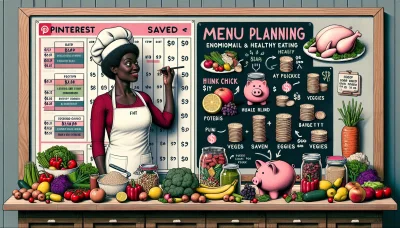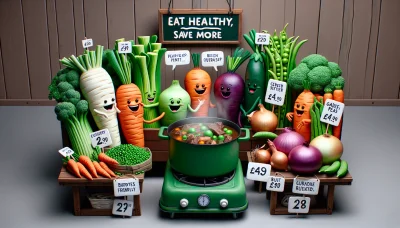Weekly Health and Wellness Discussions Quiz
Test Your Knowledge
Question of
Weekly Health and Wellness Discussions: Embracing Healthy Eating
Welcome to our series on Weekly Health and Wellness Discussions, where we delve into the importance of maintaining a healthy lifestyle through informed choices and community support. This week, we're focusing on the theme of healthy eating, a cornerstone of wellness that affects every aspect of our lives. From boosting energy levels to improving mental health, the benefits of a nutritious diet are undeniable. Join us as we explore tips, strategies, and insights on embracing healthy eating habits that can lead to a more vibrant and fulfilling life.
The Benefits of Healthy Eating
- Improves overall health
- Boosts energy levels
- Supports weight management
- Enhances mood and mental health
- Reduces the risk of chronic diseases
- Strengthens the immune system
- Promotes longevity
Top Foods for Optimal Health
| Food | Health Benefits | Recommended Servings |
|---|---|---|
| Broccoli | Rich in vitamins K and C, a good source of folate (folic acid) and also provides potassium, fiber | 2-3 cups per week |
| Salmon | High in omega-3 fatty acids, great source of protein, contains bioactive peptides that support joint cartilage and digestive health | 2 servings per week |
| Blueberries | High in antioxidants, potassium, and vitamin C | 1 cup per day |
| Nuts | Contain unsaturated fats, omega-3 fatty acids, fiber, vitamin E | A handful per day |
| Quinoa | High in protein and one of the few plant foods that contain all nine essential amino acids | 1-2 cups per week |
Overcoming Common Challenges
Eating healthily is a goal for many, but it often comes with its set of challenges. One common obstacle is the perceived high cost of healthy foods. Many believe that eating well means spending a lot on organic or specialty items. However, focusing on whole foods like grains, beans, and seasonal produce can be both economical and nutritious.
Another challenge is the convenience of unhealthy options. Fast food and processed snacks are everywhere, making it easy to choose convenience over health. Planning meals and snacks ahead of time can help overcome this. Preparing batches of healthy meals that can be refrigerated or frozen makes it easier to eat well even when you're short on time.
Lack of knowledge about how to prepare healthy meals is also a barrier for some. The internet is a treasure trove of quick, healthy recipes suitable for all skill levels. Cooking classes and meal prep workshops can also provide hands-on experience and confidence in the kitchen.
Finally, social settings often revolve around food that may not align with one's dietary goals. Communicating dietary preferences in advance or suggesting restaurants that offer healthy options can help. Additionally, bringing a healthy dish to share ensures there's something you can enjoy without compromising your goals.
Overcoming these challenges requires a mix of planning, education, and creativity. By making small, manageable changes, anyone can navigate the path to a healthier diet.
Planning Your Healthy Eating Week
- Set Your Goals - Decide what you want to achieve with your meal plan, be it weight loss, better nutrition, or simply saving time during the week.
- Assess Your Schedule - Look at your week ahead and plan your meals according to your busy days and free days. Quick and easy meals are great for your busiest days.
- Choose Your Recipes - Pick recipes that are healthy, that you enjoy, and that you feel comfortable cooking. Try to include a variety of foods to get a range of nutrients.
- Make a Shopping List - Based on your chosen recipes, write down all the ingredients you'll need. Organize your list by sections of the store to save time.
- Shop Smart - Go grocery shopping with your list in hand. Stick to the perimeter of the store where the fresh produce, meats, and dairy are located. Avoid processed foods and snacks.
- Prep Ahead - Once you have all your ingredients, start prepping meals that can be easily reheated or assembled throughout the week. Washing and chopping vegetables, cooking grains, and marinating proteins can save you a lot of time.
- Store Properly - Use clear containers to store prepped ingredients and cooked meals. Label them with the date to keep track of freshness. Remember, proper storage can extend the life of your food.
- Be Flexible - Sometimes plans change, and that's okay. If you end up not using some ingredients, think about how you can incorporate them into the next week's meal plan to reduce waste.
Incorporating Exercise into Your Routine
Combining healthy eating with regular physical activity is fundamental for maintaining overall wellness. This holistic approach ensures that your body receives the right nutrients to function optimally, while exercise strengthens your cardiovascular system, builds muscle, and helps maintain a healthy weight. Together, these practices can significantly improve your physical and mental health, enhancing your quality of life.
Join the Discussion
We invite you to share your experiences, tips, and challenges related to healthy eating in our weekly discussion forum or comment section. Whether you're a seasoned health enthusiast or just starting your journey towards better nutrition, your insights and stories can inspire and help others. Let's create a supportive community focused on achieving our health goals together!












